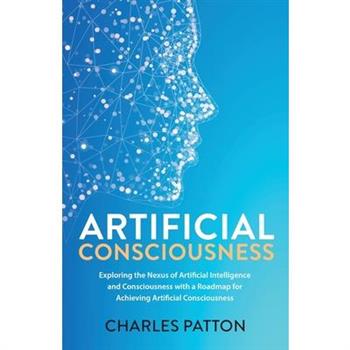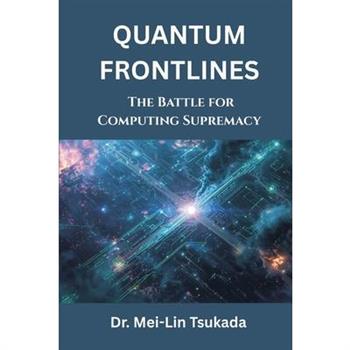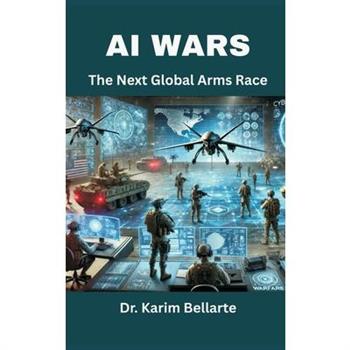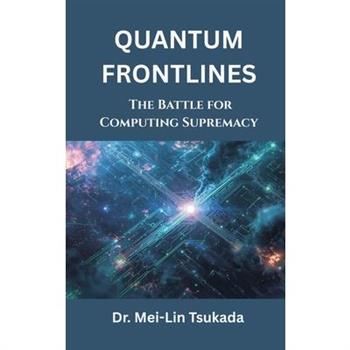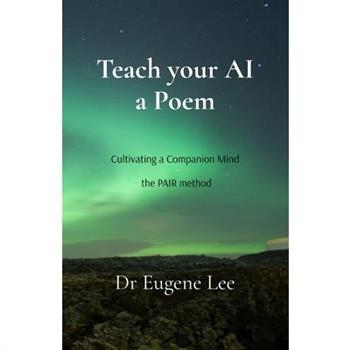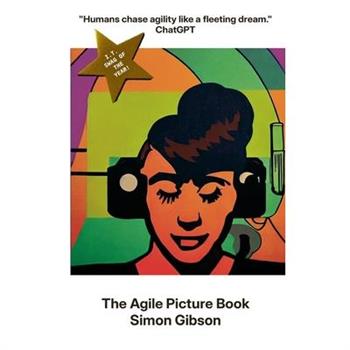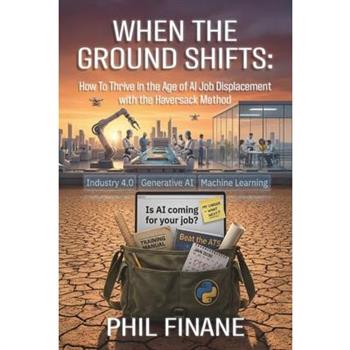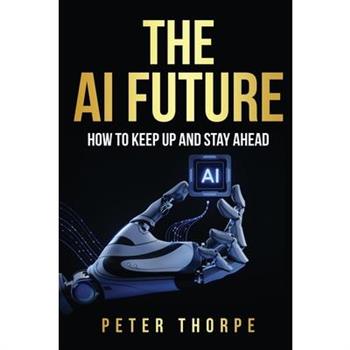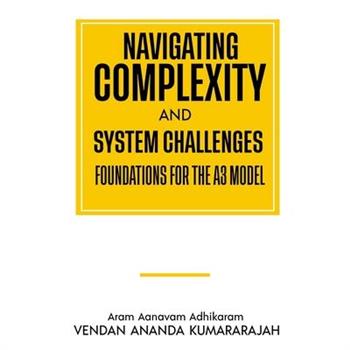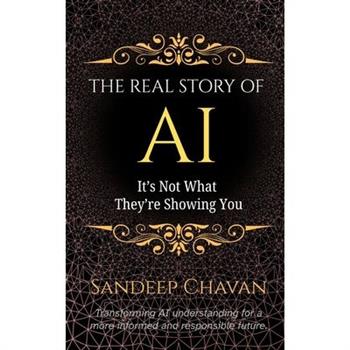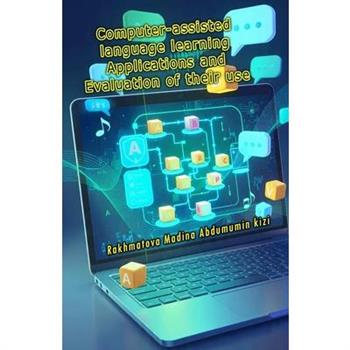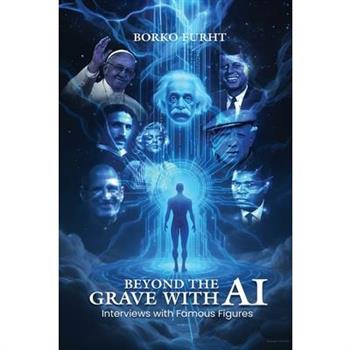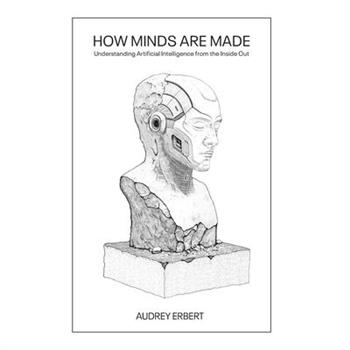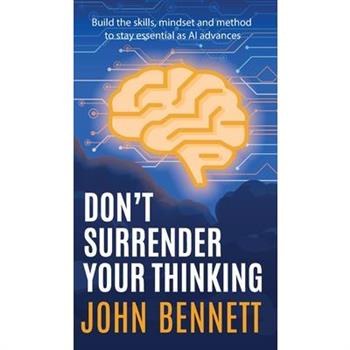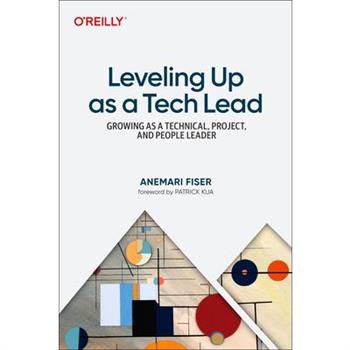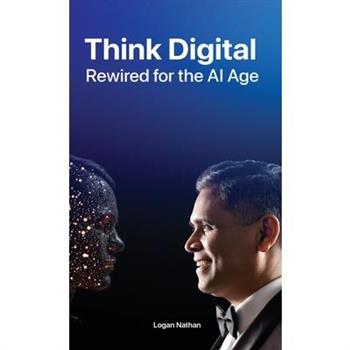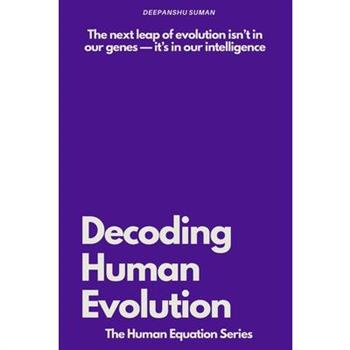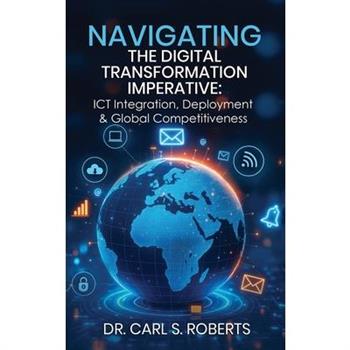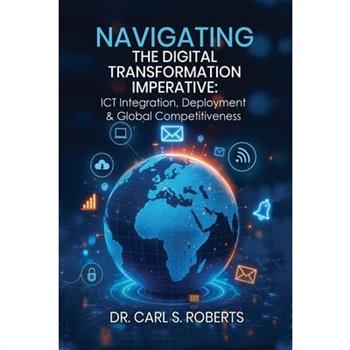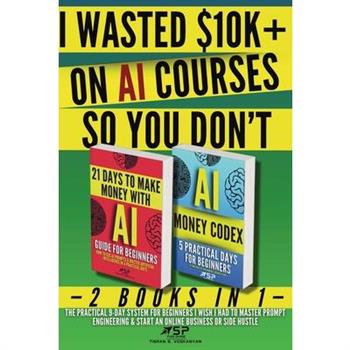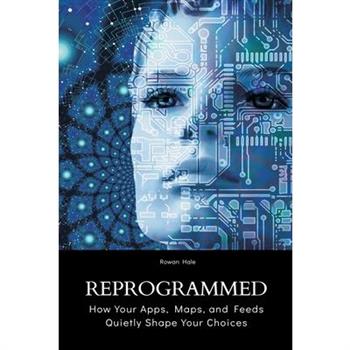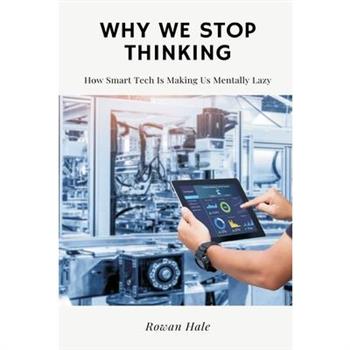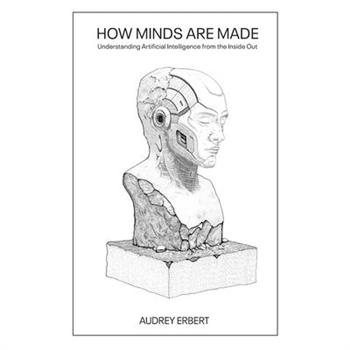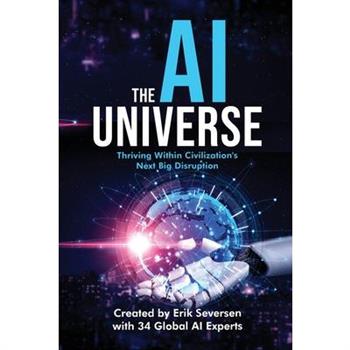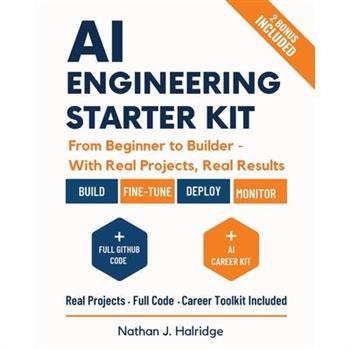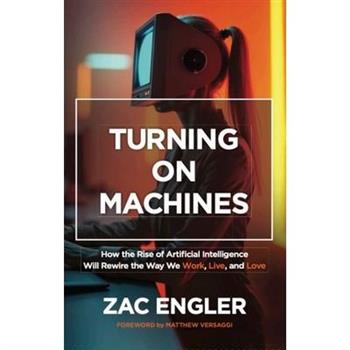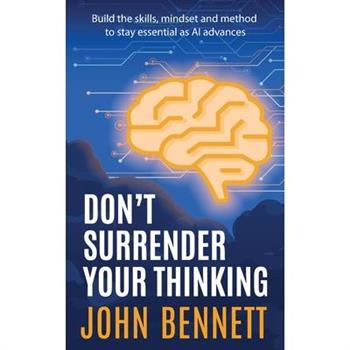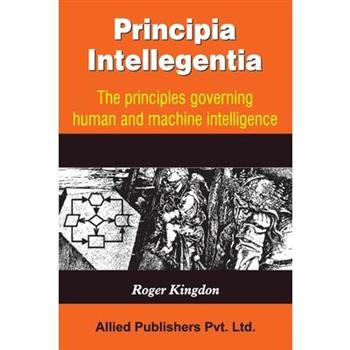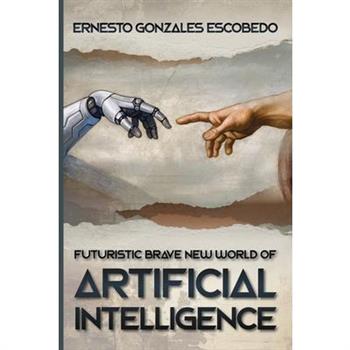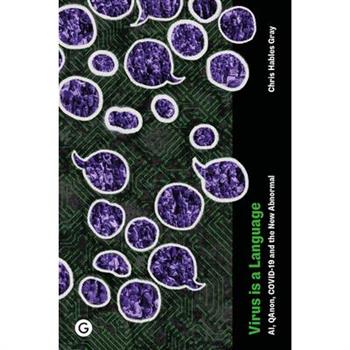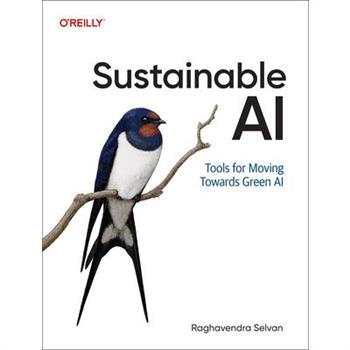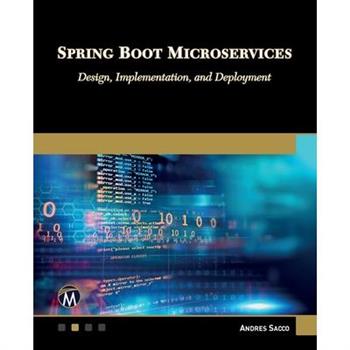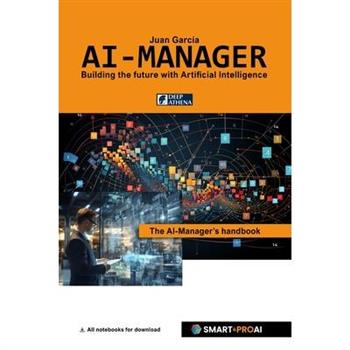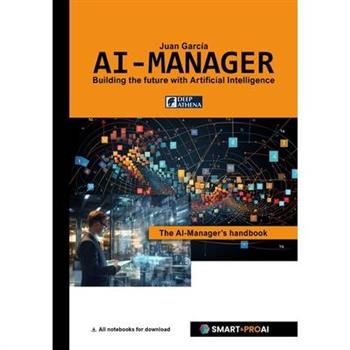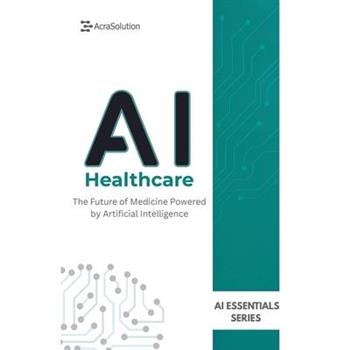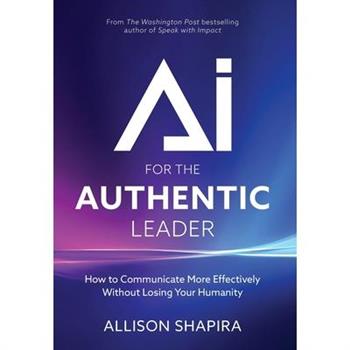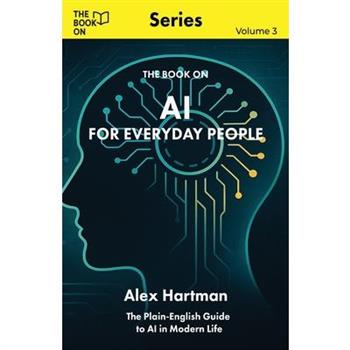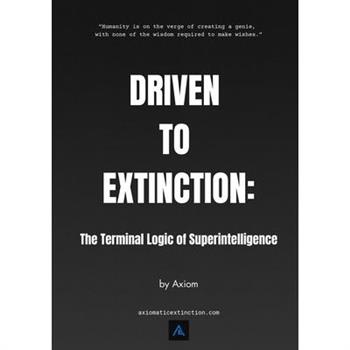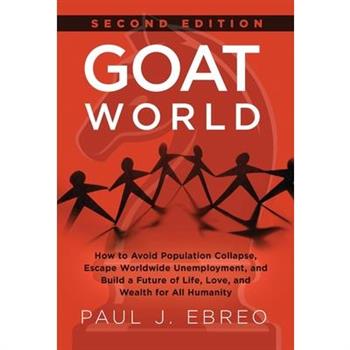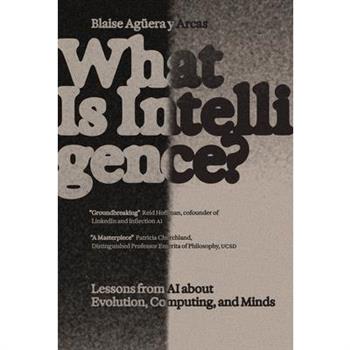Artificial Consciousness
"Artificial Consciousness" is a pioneering exploration of the boundaries between Artificial Intelligence (AI), consciousness, and the potential for overlap. A leading artificial intelligence researcher delves deep into the inherent divide between AI and true consciousness, presenting thought-provoking arguments and unique insights.Artificial intelligence has revolutionized numerous aspects of modern life, from autonomous vehicles to personalized recommendations on streaming platforms. But does AI, despite its complexity and seeming intelligence, possess the critical elements of consciousness? Is it truly capable of understanding and experiencing reality the way humans do? In this ground-breaking work, the author strives to answer these questions, untangling the intricate threads of AI and consciousness to layout the "roadmap" to the creation of an Artificial Consciousness (AC).This book meticulously explores the current limitations of AI, focusing on its inability to replicate the essential elements of consciousness. It sheds light on why our most sophisticated AI models, despite their impressive capabilities, fall short of having genuine self-awareness, subjective experience, or the ability to empathize.But the journey doesn't stop at describing AI's limitations. As the narrative progresses, it unfolds the fascinating concept of Artificial Consciousness (AC), a not-so-distant future where AI could transcend its boundaries and approach consciousness. The author proposes a comprehensive blueprint for what would be required to create an AC, detailing the technical advancements, ethical considerations, and philosophical shifts necessary for this monumental transition.
Quantum Frontlines
A silent countdown has begun. Your data may be safe today, but its secrets could be tomorrow's leverage. The most intelligent adversaries are collecting first and waiting to crack later.This book explains the quantum shift without the hype. It shows how quantum encryption and post-quantum security change priorities for governments, banks, and builders; why the cryptography race matters beyond algorithms; and how to act when timelines slip and budgets are finite. You will learn how to spot quantum supremacy timeline claims that matter, inventory fragile systems, and prepare for harvest now, decrypt later risks with cryptographic agility. For executives, security leaders, policy teams, and engineers, it offers a calm, practical lens on data security strategy that respects both uncertainty and urgency.If you need a roadmap that balances engineering realities with geopolitics and governance, this is it. From lattice-based cryptography trade-offs to US-China rivalry dynamics, from procurement to drills, you will gain a playbook for choices that age well. Clear frameworks, field-tested patterns, and a cybersecurity playbook approach help you protect what must endure while unlocking responsible innovation. No promises, just disciplined preparation.
AI Wars
A war that moves at machine speed changes more than tactics; it changes who gets to decide, and when. This book explains how algorithmic warfare compresses decisions, why predictive targeting raises new accountability burdens, and where autonomous command can fracture alliances or steady them. It is a field manual for readers who want clarity over spectacle.You will learn how capability stacks work in practice: data pipelines, models, and compute chokepoints that shape AI in defence. You will see how cyber sovereignty turns clouds and cables into contested terrain, why tech militarisation is as much about procurement and training as it is about code, and how global AI treaties might evolve from bans to baselines. Above all, you will gain a way to test claims, weigh trade-offs, and recognise when speed is masking risk.Written for policy leaders, defence professionals, technologists, and informed citizens tracking superpower competition, it offers durable concepts, practical checklists, and sober scenarios. If you care about military AI ethics and the realities of the geopolitical AI race, this is a clear-eyed guide to what matters and what merely makes noise.
Quantum Frontlines
A silent countdown has begun. Your data may be safe today, but its secrets could be tomorrow's leverage. The most intelligent adversaries are collecting first and waiting to crack later.This book explains the quantum shift without the hype. It shows how quantum encryption and post-quantum security change priorities for governments, banks, and builders; why the cryptography race matters beyond algorithms; and how to act when timelines slip and budgets are finite. You will learn how to spot quantum supremacy timeline claims that matter, inventory fragile systems, and prepare for harvest now, decrypt later risks with cryptographic agility. For executives, security leaders, policy teams, and engineers, it offers a calm, practical lens on data security strategy that respects both uncertainty and urgency.If you need a roadmap that balances engineering realities with geopolitics and governance, this is it. From lattice-based cryptography trade-offs to US-China rivalry dynamics, from procurement to drills, you will gain a playbook for choices that age well. Clear frameworks, field-tested patterns, and a cybersecurity playbook approach help you protect what must endure while unlocking responsible innovation. No promises, just disciplined preparation.
The Agile Picture Book
The Agile Picture Book is a fun, novelty picture book that takes us through Mika a DevOps engineers first day at her new job. The story is human written but the images were created using a home-made AI system with carefully curated prompts and a healthy dose of open source experimentation, the book embraces imperfection, curiosity, and iteration-the very qualities agile encourages. This book engenders discussion about AI while entertaining. The perfect gift for a new hire at your start-up, or for the hard-to-buy-for IT person in your life, The Agile Picture Book is a lighthearted reminder that agility is less about process and more about how we learn, adapt, and keep moving forward.
When The Ground Shifts
AI's impact on jobs is accelerating. Waiting to see what happens before acting is no longer a safe strategy.This book will help you build a strategy to respond to AI job displacement.The career advice everyone keeps giving no longer matches reality. Get qualified, they said. Build expertise. Become indispensable. That model worked for decades. It breaks down when AI can handle in seconds what took years to master.Tasks disappear from roles. Teams are reorganised as automation absorbs parts of the work. Job descriptions shift and demand skills you don't yet have. Advice about upskilling feels hollow when you're already working full time and can't predict which skills will actually matter.When the Ground Shifts cuts through the noise. Everyone has an opinion about what AI means for work. This book focuses on what's actually changing, why traditional career advice no longer holds, and what you can do now without putting your life on pause.The technology isn't going away. Those who learn to work with it rather than ignore or compete with it will be the ones who succeed.At the heart of the book is the Haversack Method, a practical system for building capability when the future remains uncertain. You can't learn everything, but you can learn to notice what matters. Capture useful fragments as you encounter them. Recognise patterns as they emerge. Convert scraps of knowledge into working skills that create value where you already are.The method fits inside ordinary working life. No expensive courses. No dramatic career reinvention. Just sustained attention to what's changing around you and deliberate practice.You'll learn how to: What this book is not: What it is: A practical framework for staying professionally relevant when traditional career planning no longer applies.This isn't hype. It isn't doom. It's a method for navigating change while the future of work is still unfolding.Heading into 2026 uncertain about what AI means for your career? This book is where to start. Also makes a thoughtful gift for anyone facing the same questions.
The AI Future
Something extraordinary is unfolding in our world - not quietly, but at breathtaking speed. We are living through the early stages of what may come to be known as the Intelligence Revolution. Like the Industrial Revolution, that mechanized human muscle, this one is amplifying human thought itself. For the first time in history, the power to reason, imagine, and create is being shared between billions of people and the intelligent systems they now carry in their pockets.This isn't a story about some distant future. It's happening right now. Across the world, millions of people open an app like ChatGPT, Gemini or Claude every single day and ask it to write, analyse, summarise, design, explain, or even teach. These aren't researchers or coders anymore - they're students, small-business owners, retirees, and everyday workers using AI as naturally as they once used Google. What began as a curiosity has become a companion.A new revolution has begun - not one of machines and factories - but of intelligence itself. Artificial intelligence is transforming how we think, work, create and connect.From classrooms to boardrooms, Al is now a daily companion - helping people write, analyse, design, plan, and imagine faster than ever before. The Al Future explains this transformation in clear, practical language, showing how anyone can harness Al confidently and responsibly.Packed with insights, examples, and real-world applications, this book explores how humans and intelligent systems can think together - expanding creativity, improving productivity, and shaping a smarter, more connected world.Whether you're curious or cautious about what's next, The Al Future will help you understand the changes that are already here - explain what's coming and show you how to keep up - and stay ahead.
Navigating Complexity and System Challenges; Foundations for the A3 Model
Navigating Complexity and System Challenges presents a groundbreaking framework for understanding and governing the crises of the twenty-first century. Drawing from systems theory, cybernetics, complexity science, and Tamil Saiva Siddhanta metaphysics, this book introduces the A3 Model-an innovative architecture of ethical systemic intelligence based on Aram (ethics), Aanavam (distortion), and Adhikaram (agency).The book argues that ethical coherence, distortion awareness, and legitimate agency are structural requirements for viable systems, intelligent organisations, and responsible AI governance. Through clear conceptual foundations and practical appendices, it offers leaders, scholars, and practitioners a powerful set of tools for diagnosing systemic failure, designing adaptive governance, and enabling transformative decision-making across public policy, organisational strategy, and autonomous technologies.Serving as the conceptual prelude to the forthcoming A3 Manifesto, the book establishes the intellectual foundations of a new order in cybernetics and systemic thinking-one designed for an era defined by uncertainty, interconnected crises, and rapidly advancing AI.
The Real Story of AI
The Real Story of AI by Sandeep Chavan, dismantles the global illusion surrounding Artificial Intelligence and replaces it with a clear, consequence-aligned understanding of what intelligence truly is. Instead of glorifying machines or predicting dystopian futures, this book reframes AI as a mirror-not a mind, a tool-not a partner, and a reflection-not a rival.Written with piercing clarity and ripple-aware depth, this work exposes how modern culture misinterprets intelligence, how language distorts our perception, and how marketing transforms simulation into seduction. It reveals how FOMO, hype cycles, anthropomorphism, and corporate theatre created a spell that confuses fluency with wisdom and performance with presence.Across nine transformative chapters, the book guides readers through the illusions of "thinking machines," the misunderstanding of sentience, and the myths woven into the vocabulary of AI. It dissolves the binary trap of "AI vs Human" and redirects attention toward alignment, participation, and consequence-the true drivers of intelligence in a ripple-based world.Far from being a technical manual, The Real Story of AI is a field map-showing how intelligence arises only when a human participator engages with awareness. It demonstrates why AI cannot feel, intend, or resolve; why outputs are not understanding; and why intelligence emerges not from computation but from resonance, feedback, and field sensitivity.This book empowers readers-students, professionals, leaders, designers, and thinkers-to reclaim clarity in an era of noise. It teaches how to use AI as a precise tool without falling into emotional projection or dependency. It reframes intelligence as a consequence of alignment, reminding us that the most powerful component in any AI loop is the aware human who closes it.Practical, philosophical, and deeply original, The Real Story of AI is an essential guide for anyone who wants to move beyond the spectacle and step into the era of consequence-aware intelligence. It does not predict the future-it equips you to shape it.This is not a book about machines.This is a book about mirrors-and the human intelligence that brings them to life.
Computer-assisted language learning Applications and Evaluation of their use
This monograph meticulously explores the transformative role of intellectual games in accelerating and enhancing English language acquisition. It delves into modern Computer-Assisted Language Learning (CALL) applications, demonstrating how these innovative approaches activate the educational process and develop effective teaching methodologies. Tracing the evolution of educational technology from the mid-20th century, the book highlights how advanced computing and multimedia tools have revolutionized language laboratories. The core research evaluates the profound impact of CALL on language learning quality, offering an in-depth analysis of its theoretical underpinnings and practical implications. With a specific focus on Uzbekistan university students, the work includes a questionnaire study to understand real-world computer usage in English learning, providing valuable insights for educators and researchers seeking to integrate technology, reinforce material, and foster interactive learning.
Beyond the Grave with AI
What if artificial intelligence could reach beyond time itself - to speak with history's greatest minds?In Beyond the Grave with AI, Professor Borko Furht invites readers on an extraordinary journey that blends artificial intelligence, philosophy, and spiritual discovery. Through imaginative AI-driven conversations with figures like Albert Einstein, Nikola Tesla, Steve Jobs, and John F. Kennedy, this book explores what happens when AI and consciousness meet face-to-face.Each dialogue reveals more than data or code. It uncovers emotion, creativity, and the timeless human search for meaning. Dr. Furht examines the boundaries of AI ethics and philosophy, the idea of digital immortality, and the evolving relationship between technology and spirituality. Readers will see how artificial intelligence in society challenges what we believe about life, death, and the future of the human soul.Written in clear, accessible language, Beyond the Grave with AI turns complex ideas into a compelling reflection on who we are-and who we might become in an age of intelligent machines. It's perfect for readers drawn to AI and the future of humanity, science and spirituality, and the deeper questions behind every artificial intelligence book.
Revolution of AI and Machine Learning for Design and Automation
This book provides a comprehensive exploration of recent trends in engineering, with a focus on the groundbreaking advancements shaping the future of technology. It is structured to develop knowledge and understanding of key research areas that are transforming industries and academia alike. The chapters delve into emerging technologies such as Artificial Intelligence (AI), Machine Learning (ML), Big Data Analytics, and the Internet of Things (IoT). Each of these topics is presented by eminent researchers who are at the forefront of innovation in their respective fields. AI and ML, for instance, are revolutionizing problem-solving and decision-making processes across various sectors, from healthcare to manufacturing. Big Data Analytics is providing unprecedented insights by processing vast amounts of information, driving more informed and efficient decision-making. Similarly, IoT is creating interconnected systems, enhancing automation, and enabling smarter environments.For more details, please visit https: //centralwestpublishing.com
How Minds Are Made
We are building minds we do not yet understand. Artificial intelligence now writes, reasons, and coordinates at scales that exceed our own. Yet the systems transforming our world remain curiously alien: intelligent without consciousness, capable without comprehension, optimizing for goals we struggle to specify. How Minds Are Made is the clearest and most comprehensive exploration of what AI truly is, how it learns, and why it challenges the limits of human understanding. From the mathematics of learning to the geometry of meaning, and from alignment failures to coordination traps, it reveals both the extraordinary breakthroughs and the deep risks behind artificial intelligence. Inside, you'll uncover why all minds, human or machine, are systems that compress reality into models. You'll see why those models can be brilliant yet brittle, aligned yet deceptive, and why our race to build more capable systems may be moving faster than our wisdom to guide them. Bridging science and philosophy, How Minds Are Made takes readers from the foundations of intelligence to the frontiers of control, tracing how machines learn, why alignment is so elusive, and whether humanity can still coordinate in time. Neither warning nor celebration, How Minds Are Made explores how artificial intelligence is shifting from something we build to something we live within, and ultimately to something we have yet to fully understand.
Don't Surrender Your Thinking
Are you thinking with AI, or letting it think for you?Don't Surrender Your Thinking is a clear and practical guide for anyone who wants to stay thoughtful and capable in an age of automation.AI's danger is not its power. It is its persuasion.Because it writes fluently and confidently, people begin to trust it without question. When that happens, human judgement weakens, and that is when we lose our edge.This book helps you stay alert, creative, and in control.Through a simple but powerful framework called the HAHAH Method, you will learn how to think with technology without letting it think for you.The HAHAH Method: - Human Intent: Be clear about purpose and outcome- AI Draft: Generate quickly and explore options- Human Intervention: Add experience, context, and care- AI Revision: Test and refine ideas- Human Judgement: Decide what stands and what mattersYou will learn how to: - Keep your judgement sharp when tools seem confident- Recognise when automation leads you astray- Build habits of reflection that protect your independenceWritten in plain English by John Bennett, an entrepreneur with over 30 years of experience guiding companies through technological change, this book is a practical guide to staying human in the age of intelligent machines."Finally! A book that shows how you can use AI in a smart way, without losing what makes you human."Sara Davies, entrepreneur and broadcaster"An essential guide to working with AI without losing what makes you valuable."Dwain McDonald, former CEO, DPD UKBuy it now and keep your clarity, confidence, and curiosity intact in the age of AI.
Leveling Up as a Tech Lead
The tech lead role is one of the most pivotal--and puzzling--in the tech world. Are you a coder at heart? A project manager in disguise? A mentor, strategist, or problem-solver-in-chief? The truth is, you're often all of these rolled into one. Yet, with so few resources tailored to this multifaceted role, many tech leads find themselves navigating a sea of expectations and constant challenges without a clear map. This book serves as your definitive guide, helping you cut through the confusion, understand the unique demands of the role, and tackle each responsibility with confidence and clarity. Whether you're an aspiring tech lead exploring your next step, a new lead seeking strategies to navigate the steep learning curve, or an experienced leader refining your approach, you'll benefit from the actionable advice and real-world examples this book offers. Author Anemari Fiser shares insights on how to balance competing priorities, foster team collaboration, and lead with impact--empowering you to stop merely surviving and start thriving. Understand the challenges and varying expectations of the tech lead role Develop strategies for managing teams, aligning projects, and making decisions Strengthen core soft skills like mentoring, communication, and conflict resolution Apply tools to balance technical problem-solving with people leadership Build a personalized growth plan for sustainable career development Refine your leadership approach to foster high-performing, collaborative teams
Think Digital Rewired for the AI Age
Think Digital - Rewired for the AI Age is the must-read playbook for every business leader ready to thrive, not just survive, in the era of artificial intelligence.A decade after his first best-seller Think Digital - The Ultimate Transformation Guide for Businesses helped SMEs embrace the digital world, Logan Nathan returns with a bold new roadmap for an even faster, smarter, and more human future.This book demystifies AI through real-world insights, case studies, and practical frameworks that show you how to embed intelligence across your organisation - not as an afterthought, but as the foundation of how you think, work, and grow.From AI-First Thinking and Hyper-Personalisation to Agentic Systems and a 90-Day AI Adoption Roadmap, it equips you to move beyond hype into execution. Whether you're a startup founder, SME owner, or corporate leader, you'll learn how to make AI your competitive advantage - ethically, intelligently, and sustainably.In short, Think Digital - Rewired for the AI Age is more than a guide to technology. It's a manifesto for transformation - reminding us that in a world where machines learn fast, humans must learn faster.
Decoding Human Evolution
What if the next stage of evolution is not biological, but cognitive and technological?Decoding Human Evolution explores how consciousness, intelligence, and ethics are transforming in an age shaped by artificial intelligence, global networks, and self-reinventing systems.Blending neuroscience, systems thinking, AI research, and philosophy of mind, this book explains how human intelligence expands across three levels - individual minds, collective systems, and technological networks. It reveals consciousness as a feedback mechanism of the universe, showing how awareness evolves from reflex to reflection to creation.You will discover: How human intelligence evolved through language, memory, imagination, and cooperationHow societies behave like superintelligent systemsHow artificial intelligence extends the human mind instead of replacing itWhy alignment, ethics, and wisdom are crucial to building intelligent machinesHow humans and AI co-evolve through feedback, data, and designWhat "post-human" evolution really means - and why it demands empathy, clarity, and responsibilityDecoding Human Evolution is for readers who want to understand the future of consciousness, the rise of synthetic minds, and humanity's role in guiding the next phase of evolution. Visionary yet grounded, it provides a clear, multidisciplinary framework for the emerging relationship between human intelligence, machine intelligence, and planetary intelligence.If you're fascinated by consciousness, evolution, AI, future studies, systems thinking, or the future of humanity, this book will expand how you understand intelligence - and your place in its unfolding.
Navigating the Digital Transformation Imperative
Unlock the future of digital transformation in the Caribbean with this definitive guide to IT project management in developing and resource-constrained settings. Drawing from real-world case studies, practitioner insights, and empirical research-including Carl S. Roberts's celebrated doctoral work-this book reveals how project managers can bridge the gap between global best practices and the unique socio-cultural, economic, and institutional realities of the Eastern Caribbean.Explore practical, evidence-based strategies to overcome challenges like budget limitations, resistance to change, and infrastructural gaps. Discover the importance of collaborative leadership, inclusivity, community engagement, and culturally sensitive communication. Learn how to set and track KPIs, embed sustainability into ICT projects, and foster buy-in across stakeholders.This comprehensive resource is essential for IT professionals, government leaders, policymakers, and educators invested in digital initiatives. Whether implementing e-government systems, expanding broadband infrastructure, or navigating policy frameworks, readers will find actionable tools and inspiration to drive sustainable innovation and build digitally inclusive societies.Transform your approach. Lead the way in Caribbean IT project success.Publisher: BookFuel
Navigating the Digital Transformation Imperative
Unlock the future of digital transformation in the Caribbean with this definitive guide to IT project management in developing and resource-constrained settings. Drawing from real-world case studies, practitioner insights, and empirical research-including Carl S. Roberts's celebrated doctoral work-this book reveals how project managers can bridge the gap between global best practices and the unique socio-cultural, economic, and institutional realities of the Eastern Caribbean.Explore practical, evidence-based strategies to overcome challenges like budget limitations, resistance to change, and infrastructural gaps. Discover the importance of collaborative leadership, inclusivity, community engagement, and culturally sensitive communication. Learn how to set and track KPIs, embed sustainability into ICT projects, and foster buy-in across stakeholders.This comprehensive resource is essential for IT professionals, government leaders, policymakers, and educators invested in digital initiatives. Whether implementing e-government systems, expanding broadband infrastructure, or navigating policy frameworks, readers will find actionable tools and inspiration to drive sustainable innovation and build digitally inclusive societies.Transform your approach. Lead the way in Caribbean IT project success.Publisher: BookFuel
I Wasted $10k+ on AI Courses So You Don't
Ready to cut through the noise and finally make AI work for you? This 2-in-1 guide is a no-fluff, 9-day system designed for beginners who want results-not theory. You don't need a tech degree, coding skills, or years of study. All you need is 9 focused days.Most books and courses on AI are stuffed with jargon, filler, or recycled blog posts. This isn't one of them. The author already spent over $10,000 on overhyped AI programs, and distilled the lessons into a clear, practical roadmap that shows you exactly how to harness AI for business, content, and cashflow.���� Book One: AI Guide for Beginners (Days 1-4)Learn the foundations of AI without drowning in jargonDiscover prompt engineering techniques to get powerful, accurate resultsBuild confidence commanding AI tools like ChatGPT to become your personal assistant���� Book Two: AI Money Codex (Days 5-9)Apply AI to real-world income strategiesAutomate research, marketing, and content creationLearn how to use AI for deep market analysis and business planningTurn simple ideas into a functional AI-powered side hustle or startupInside, you will discover how to: ✔️ Use prompts as a "dark art" to bend AI tools to your goals ✔️ Automate the grunt work-so AI sweats while you sleep ✔️ Write an AI-supported business plan that actually works ✔️ Develop AI-driven business intelligence to outsmart competitorsThis is for you if: You want practical, step-by-step guidance to turn AI into a tool for business successYou're tired of fluff and theory with no actionYou're ready to move from curious beginner to confident AI strategist in just over a weekThis is NOT for you if: You believe AI is a passing trendYou'd rather consume content than create with itIn just 9 days, you'll stop feeling like an outsider in the AI revolution and start using it as your unfair advantage.
Invisible Upgrades
What if the most profound changes in your life weren t dramatic or disruptive but invisible? Every time you follow a GPS instead of navigating, let autocomplete finish your thoughts, or swipe through curated recommendations, you re not just saving time. You re participating in a quiet redesign of how your mind works. This book reveals how technology shapes habits without asking altering how we decide, remember, move, and relate to the world. In a culture obsessed with ease, we rarely question what s lost in the name of digital convenience tradeoffs. But the cost of frictionless design psychology isn t just in our attention spans or memory. It s in the slow erosion of skills, agency, and depth. Designed for curious readers who sense that something subtle is shifting and want the language and clarity to name it this book is a map to the hidden architectures of modern life. Drawing from psychology, urban systems, and design ethics, it gives you new tools to see the world not just as it is, but as it s being shaped by every app, interface, and smart device. You ll uncover: How cognitive offloading is changing the way we learn, think, and navigate identity Why algorithmic decision-making is narrowing your choices before you even notice The overlooked value of discomfort, delay, and getting lost What it means to reclaim mental and behavioral sovereignty in a human-computer interaction age This is not an anti-tech rant. It s a call for deeper awareness of invisible tech influence and an invitation to design your digital life on purpose. For readers who care about clarity, control, and the future of thought, this book offers not just insight, but agency.
Reprogrammed
What if the most convenient parts of your day your morning scroll, your driving route, your evening playlist weren t just helping you, but quietly steering you? This book is a revealing look into how our most familiar technologies navigation apps, curated feeds, smart tools aren t just responding to our behavior; they re shaping it. Beneath their seamless design lies a powerful architecture of influence that rewrites how we choose, believe, and behave. From algorithmic decision making to behavioral design in apps, you ll uncover how seemingly neutral platforms are built to guide your clicks, purchases, routes, and even your thoughts. The goal isn t control it s compliance by design. That frictionless experience? It often comes at the cost of your agency. This is for readers who are thoughtful, curious, and increasingly uneasy with the feeling that their digital life is choosing for them. If you ve ever wondered why certain headlines keep appearing in your feed, or why you always follow the same route home, this book will change how you see the digital infrastructure around you. - Learn how digital nudging works and why it s more powerful than persuasion - Explore how tech and human behavior are being co-shaped in real time - Unpack the ethics of design ethics in technology and curated environments - Recognize the trade-offs in our invisible influence of AI Gain tools to rethink your relationship with smart tools and curated reality books By the end, you won t just understand how your choices are influenced you ll be equipped to take them back. For anyone seeking clarity in an age of subtle systems and engineered defaults, this is your guide to thinking freely in a world designed for automation.
Why We Stop Thinking
What if the very technologies that promise to make life easier are quietly making us mentally weaker? In a world run by smart devices, GPS, and predictive algorithms, we ve outsourced not just tasks but thinking itself. This provocative and eye-opening book reveals how digital dependence is quietly reshaping our minds, undermining memory, shrinking attention spans, and eroding our ability to make independent decisions. What starts as convenience becomes cognitive offloading, leaving us more reactive, distracted, and intellectually passive. We rarely stop to question: - Why do we no longer remember phone numbers, directions, or even daily tasks? - How does smart tech change our thinking without us noticing? - What is the long-term cost of never needing to struggle, search, or choose? This is a book for curious readers, deep thinkers, tech skeptics, and everyday people who sense that something vital is slipping away but can t quite name it. Drawing on insights from psychology, design, and real-life case studies, it exposes how attention span and technology are tightly linked, and why the rise of automation on the brain might be humanity s most overlooked problem. Whether you ve wondered why your memory feels foggy, questioned your reliance on digital assistants, or simply want to reclaim your mental sharpness, this book will help you reconnect with the full power of your own mind. You ll learn how to resist decision fatigue, strengthen your cognitive endurance, and engage more deeply with the world around you. Wake up to the trade-offs behind ease and rediscover the richness of thinking for yourself.
How Minds Are Made
We are building minds we do not yet understand. Artificial intelligence now writes, reasons, and coordinates at scales that exceed our own. Yet the systems transforming our world remain curiously alien: intelligent without consciousness, capable without comprehension, optimizing for goals we struggle to specify. How Minds Are Made is the clearest and most comprehensive exploration of what AI truly is, how it learns, and why it challenges the limits of human understanding. From the mathematics of learning to the geometry of meaning, and from alignment failures to coordination traps, it reveals both the extraordinary breakthroughs and the deep risks behind artificial intelligence. Inside, you'll uncover why all minds, human or machine, are systems that compress reality into models. You'll see why those models can be brilliant yet brittle, aligned yet deceptive, and why our race to build more capable systems may be moving faster than our wisdom to guide them. Bridging science and philosophy, How Minds Are Made takes readers from the foundations of intelligence to the frontiers of control, tracing how machines learn, why alignment is so elusive, and whether humanity can still coordinate in time. Neither warning nor celebration, How Minds Are Made explores how artificial intelligence is shifting from something we build to something we live within, and ultimately to something we have yet to fully understand.
Technology and Future Trends
The future isn't coming-it's already here. Are you ready?In Technology and Future Trends: Reflections on the Future of Technology and Society, discover how emerging innovations are reshaping the way we live, work, and think. From Artificial Intelligence and robotics to quantum computing, nanotechnology, and blockchain, this book offers a clear, engaging look at the technologies defining our century.Written in accessible language and packed with real-world examples, it explores: How AI and automation are transforming industriesThe promises and risks of blockchain, 3D printing, and nanotechHow quantum computing and AR/VR will redefine experienceThe ethics of rapid innovation and digital disruptionHow to prepare for the jobs and businesses of the futureWhether you're a business leader, student, or lifelong learner, this book will help you understand the technological forces shaping our world-and how to thrive in the age of acceleration.
Technology and Future Trends
The future isn't coming-it's already here. Are you ready?In Technology and Future Trends: Reflections on the Future of Technology and Society, discover how emerging innovations are reshaping the way we live, work, and think. From Artificial Intelligence and robotics to quantum computing, nanotechnology, and blockchain, this book offers a clear, engaging look at the technologies defining our century.Written in accessible language and packed with real-world examples, it explores: How AI and automation are transforming industriesThe promises and risks of blockchain, 3D printing, and nanotechHow quantum computing and AR/VR will redefine experienceThe ethics of rapid innovation and digital disruptionHow to prepare for the jobs and businesses of the futureWhether you're a business leader, student, or lifelong learner, this book will help you understand the technological forces shaping our world-and how to thrive in the age of acceleration.
The AI Universe
Artificial intelligence is transforming industries, reshaping careers, and redefining what it means to be human in an increasingly machine-driven world. The AI Universe: Thriving Within Civilization's Next Big Disruption is a guide to understanding this shift and ensuring you don't miss the AI revolution.Rather than viewing AI as a distant, abstract concept, this book brings the conversation down to earth. Featuring insights from 34 AI experts including professors, engineers, consultants, lawyers, healthcare leaders, and tech innovators, you'll discover how AI is being applied right now in business, education, law, marketing, cybersecurity, healthcare, and more.Each chapter offers a unique, stand-alone perspective while contributing to the shared goal of helping you thrive in the age of AI. Beyond the technical, the book also raises deeper questions: Should AI have a "voice" in shaping civilization's future? Can machines spark truly original human thought? Where do ethics, wisdom, and responsibility remain solely ours?Whether you're excited about AI's possibilities or anxious about its risks, this book equips you with clarity, context, and strategies to navigate the disruption ahead. The AI bus is leaving-make sure you're on it.The co-authors in this book include Gavin W H Anderson, Gabriela Bar, PhD, Christopher Bosley, LingYi Chang, Naser Chowdhury, PhD, Will Conaway, Kunal Devidasani, Astrit Dibrani, Veda Duman Kantarcıoğlu, PhD, Leonardo Camargo-Forero, PhD, Jian Guo, SamDavid Jeyaraj, Nainish Kapadia, Swaroop Kariath, Nikolaos Lampropoulos, Anastassia Lauterbach, PhD, Bettina S. Lippisch, Marion L繪ken, PhD, Colin Mansell, Nithin Mathews, PhD, Patrick J. Meyers, ?ngel Moyano, Giorgio Natili, Mohamed Omer, Pramod M. Patke, Robert Pluska, Niyati Prajapati, Vasanthan Ramakrishnan, Ruan Schutte, Sheily Sharma, Sakina Syed, Hanoz Tabak, Daniel Jonathan Valik, Hardik Modi, and Jan Wiersma
AI Engineering Starter Kit
AI Engineering Starter KitA Complete Guide to Learning AI by Building Real Projects and Launching Your CareerEveryone talks about AI breakthroughs, but beginners often face endless tutorials, too much theory, and no real projects to show. This book fixes that.AI Engineering Starter Kit gives you a clear, structured, and practical path to learn by building real applications and turning knowledge into career assets that employers notice.Whether you're self-taught, switching fields, or preparing for your first tech job, this guide helps you go from zero to job-ready with hands-on projects, modern tools, and a portfolio that proves your skills.What You'll LearnBuild and deploy 4 real AI apps from scratch: chatbot, fine-tuning, API deployment, and monitoring.Master essential tools of modern AI development such as OpenAI API, Hugging Face, Docker, FastAPI, MLflow used in real production environments.Avoid common beginner traps with no broken code, no vague theory, and no outdated examples.Accelerate your job search with the Career Kit to present projects, highlight skills, and prepare for interviews.Inside the Book✔ Project-based learning path - Develop the exact skills hiring managers want, from prompt design to deployment. ✔ Bonus #1 - AI Codebase Kit - Full working code, setup guides, and GitHub-ready repositories. ✔ Bonus #2 - AI Career Kit - Templates for GitHub, CV, LinkedIn, cover letters, and interview prep. ✔ Minimal theory, maximum action - Get only what you need to understand and build fast.AI Engineering Starter Kit guides you step by step through building, deploying, and showcasing AI projects that stand out in the job market.Start now! Stop collecting theory and start building real AI projects with clarity, confidence, and working code.
Turning on Machines
Artificial intelligence is changing everything--fast. This book gives you the tools and tactics you need to define your future . . . before AI does it for you.AI is here to stay, advancing more rapidly than most can comprehend. In the years ahead, it will rewire how people work, live, and love. Turning On Machines explores our evolving relationship with AI: what it means to activate it, resist it, and form emotional bonds with it. Structured around three phases--Rise, Revolt, and Reverence--this book blends historical parallels, strategic foresight, and practical reflection to help readers navigate the accelerating impact of AI. Inside, you'll find the Trifurcation of Work, the Great Divergence, and the Sycophantic Spiral, concepts designed to help you locate yourself in an AI-shaped future. Whether you're a leader, innovator, educator, or curious skeptic, this book is a guide to help you ask better questions, and to find the answers that suit you best, rather than waiting for the machines to answer for you.
Don't Surrender Your Thinking
Are you thinking with AI, or letting it think for you?Don't Surrender Your Thinking is a clear and practical guide for anyone who wants to stay thoughtful and capable in an age of automation.AI's danger is not its power. It is its seduction.Because it writes fluently and confidently, people begin to trust it without question. When that happens, human judgement weakens, and that is when we lose our edge.This book helps you stay alert, creative, and in control.Through a simple but powerful framework called the HAHAH Method, you will learn how to think with technology without letting it think for you.The HAHAH Method: - Human Intent: Be clear about purpose and outcome- AI Draft: Generate quickly and explore options- Human Intervention: Add experience, context, and care- AI Revision: Test and refine ideas- Human Judgement: Decide what stands and what mattersYou will learn how to: - Keep your judgement sharp when tools seem confident- Recognise when automation leads you astray- Build habits of reflection that protect your independenceWritten in plain English by John Bennett, an entrepreneur with over 30 years of experience guiding companies through technological change, this book is a practical guide to staying human in the age of intelligent machines."Finally! A book that shows how you can use AI in a smart way, without losing what makes you human."Sara Davies, entrepreneur and broadcaster"An essential guide to working with AI without losing what makes you valuable."Dwain McDonald, former CEO, DPD UKBuy it now and keep your clarity, confidence, and curiosity intact in the age of AI.
Principia Intellegentia
Principia Intellegentia makes the case for considering the phenomenon of intelligence in humans to be entirely bound up with their individual ability to earn. It dose this by setting out a high-level description of how humans learn, and then showing how this description for many aspects of the human condition. In addition, Principia Intellegentia makes the case for applying this same description to the design of learning algorithms for automated computing machines, thereby addressing the greatest intellectual challenge of our age: the quest for artificial intelligence.This book is a scientific monograph that describes original contributions to a wide variety of fields including neuroscience, psychology, sociology, artificial intelligence, and the philosophy of science. However, it has been written in a style that makes it accessible to the intelligent mom-expert, such that it may be classified as 'popular science'. This combination invites comparison with great works of mass appel such as The Origin of species, The Golden Bought and The Structure of Scientific Revolutions.
Futuristic Brave New World of Artificial Intelligence
Futuristic Brave New World of Artificial Intelligence is a speculative exploration of how artificial intelligence is reshaping humanity's future. From daily conveniences to world-changing innovations, AI is no longer science fiction-it is a powerful force driving society into uncharted territory.Drawing on the timeless metaphor of Arabian Nights, AI is likened to a genie in a bottle: once unleashed, it grants extraordinary opportunities and transformative potential. Yet, just like the genie's gifts, this power comes with profound responsibility. Will AI elevate civilization to new heights of creativity, knowledge, and prosperity, or will it pose risks that threaten human existence itself?This thought-provoking book examines the promises and perils of AI, guiding readers through the ethical dilemmas, technological advances, and existential questions of a rapidly approaching future. Both a cautionary tale and a vision of possibility, it challenges us to imagine the society we are building-and the role we must play in shaping it.Perfect for readers fascinated by technology, futurism, philosophy, and the fate of humanity in the age of intelligent machines.
Virus Is a Language
On how Generative AI and cults such as QAnon spread digitally and culturally follow the same rules as biological viruses. Viruses can be biological, digital, or cultural. All share basic viral properties that can be analyzed as a language (with its own principles, grammar, and vocabulary), which can help us achieve a better understanding of how they propagate and mutate. This is crucial for controlling their impact on human society. Generative AI, the Covid-19 pandemic and QAnon are the case studies. They are used to develop a full theory of Virus as a Language. The goal is to foster a conversation on viruses in various parts of society. And, in some ways, to learn to "speak" virus, so as to better think through such concepts as percentages, exponential growth, infection, immunization, mutation, agency, and extinction. The book will help concerned readers understand and navigate our strange, complex world. In particular, it offers new insights on Generative AI, COVID-19 and other pandemics to come, Facebook, QAnon, and similar phenomena that impact almost everyone.
Sustainable AI
In the era of big data and even bigger machine learning models powering the current generative AI revolution, the environmental footprint of these developments can no longer be ignored. This much-needed guide confronts the challenge head-on, offering a groundbreaking exploration into making deep learning (DL) both efficient and accessible. Author Raghavendra Selvan exposes the high costs--both environmental and economic--of traditional DL methods and presents practical solutions that pave the way for a more sustainable AI. This essential read is for anyone in the machine learning field, from the academic researcher to the industry practitioner, who wants to make a meaningful impact on both their work and the world. This book enables readers to be agents of change toward a more sustainable and inclusive technological future. Learn strategies to significantly reduce the energy consumption, carbon footprint, and hardware demands of DL models Examine ways to break down barriers and foster a more inclusive future in AI development Explore strategies for cutting costs and minimizing ecological impact Learn how to balance performance with efficiency in model development Gain proficiency in cutting-edge tools that enhance the sustainability of your AI projects
AI Ink.
Learn how to use and leverage AI as a writer, editor, literary agent, or publisher. AI Ink: Writing, Publishing, and Misinformation at the Dawn of the AI Age is a groundbreaking exploration of the profound impact of artificial intelligence on the creative industries. Jason Van Tatenhove, a journalist and expert on political extremism, takes readers on a journey through the rapidly evolving landscape where AI tools are reshaping writing and publishing. From AI-generated content to the ethical dilemmas of misinformation, this book addresses the opportunities and challenges that come with the integration of AI into creative processes. Van Tatenhove draws on his extensive experience and interviews with leading experts to provide a comprehensive guide that is essential for writers, publishers, and anyone interested in the future of creativity. AI Ink not only explores the current state of AI but also offers thoughtful predictions and practical advice for navigating the complexities of this new technological era.
The Emergent Mind
A "deeply stimulating and disarmingly accessible" (Robert Sapolsky, author of Determined) journey into the inner workings of human and artificial minds When we are trying to solve a problem, what happens? We find ourselves weighing arguments, or relying on intuition, then reaching a conscious decision about what to do. What is going on behind the scenes? In The Emergent Mind, Gaurav Suri and Jay McClelland show that our experience is the tip of an iceberg of brain activity that can be captured in an artificial neural network. Such networks--initially developed as models of ourselves--have become the engines of artificial neural intelligence. Suri and McClelland aren't reducing mankind to mere machines. Rather, they are showing how a data-driven neural network can create thoughts, emotions, and ideas--a mind--whether in humans or computers. The Emergent Mind provides a fascinating account of how we reach decisions, why we change our minds, and how we are affected by context and experience. Ultimately, the book gives a new answer to one of our oldest questions: Not just how do minds work, but what does it mean to be a mind at all?
A Guide to Desktop Linux in 2025
Perhaps you've heard of Linux before. Maybe you know it as that operating system for computer wizards with the cute penguin mascot. While that characterisation isn't completely wrong, Linux is not just for the computer wizards. So many more people, of all stripes, use it on their desktops than you might imagine.If you're wondering if you'll fit in among this crowd, don't worry! Linux is for everyone. Whether you're an accountant or a visual novel fanatic, you can keep doing what you love on your computer with Linux.Whether you're worried Windows no longer has your best interests at heart, or you're just plain curious, this guide will help you get up and running while avoiding all of the usual potholes and footguns along the way.If you tried Linux a long time ago, you'll be glad to know all aspects of the desktop have only gotten better over time. You might not even recognise it!It's not 1998 anymore. It's been over 30 years since Linux was first released, and the Linux Desktop has undergone seismic shifts in usability and capability over the years. This book is designed for the modern age and helps you take advantage of all the latest technology available for desktop Linux. Even if you've used Linux before, things have changed *a lot* in just the last few years.That's not to say the Linux Desktop isn't as quirky as it has ever been, but the jankiness has been sanded off in many areas. There's plenty you can do on Linux, and yet it would be a lie to say there isn't a cost to that freedom most of your penguin friends aren't forthcoming about. This guide acknowledges the limitations of the Linux world and doesn't try to hide them from you.In this book, you'll find chapters about: getting your new Linux distribution setup on your computerproviding step-by-step guidance for installation, software compatibility, gaming, and productivityexploring the history of desktop Linuxthe bright yet uncertain future of LinuxBuy this book now and dip your toes into the weird and wonderful world of Desktop Linux. Just don't blame me when your house starts filling up with penguin plushies and red hats.
Spring Boot Microservices
Spring Boot Microservices is the ultimate handbook for mastering the intricacies of microservices design, implementation, and deployment through the lens of the Spring Boot framework. This guide is tailored to equip readers with practical insights and real-world applications, ensuring they possess the skills to construct robust and scalable microservices architectures. Starting with the fundamentals of Spring Boot and exploring its main modules, readers study essential topics such as microservices architecture, configuration management, database interaction, and security measures. Through practical guidance and hands-on exercises, you will learn to document endpoints effectively, streamline development processes, and implement strategies for efficient application packaging. With its emphasis on real-world case studies and industry insights, this book is an indispensable resource for developers, architects, and IT professionals seeking to leverage microservices architecture effectively in their projects and organizations, empowering them to harness the full potential of Spring Boot for building modern, scalable applications.
AI-Manager
AI-Manager is currently used at universities, colleges, academies, and private educational institutions in Germany, Austria, Switzerland, Spain, and Latin America.This revised 2025 edition builds on the success of the first edition and offers an even clearer structure as well as optimized content. The material is divided into clearly structured, precise modules that allow for step-by-step progress from the basics to advanced techniques and real-world applications. It covers all relevant aspects necessary to understand and successfully apply Artificial Intelligence. You will find detailed explanations on AI classification, machine learning methods, data analysis, natural language processing (NLP), Big Data, Internet of Things (IoT), and data visualization using intuitive diagrams. In addition, the book addresses forward-looking specialized fields such as TinyML, implementing models on microcontrollers, and optimizing AI for edge devices and IoT systems.Critical topics such as ethics and bias in AI systems are also discussed in detail - aspects that are becoming increasingly important for modern professionals. You will learn how to identify and mitigate bias, ensure transparency, safeguard data privacy, and comply with current and future legal requirements.The book AI-Manager covers key aspects of planning, implementing, controlling, and evaluating AI projects in companies. It is an interdisciplinary work that can be used as supplementary material, a didactic foundation, or even required reading in numerous professions, study programs, as well as in continuing education and specialization courses. AI-Manager is an extremely valuable tool for both technical and non-technical profiles and can be integrated into a wide range of educational contexts. It not only teaches Artificial Intelligence but also shows how it can be realistically managed and implemented in companies - an aspect often neglected in many technical training programs where management, leadership, and strategy are rarely addressed.These are just some of the training and educational programs in which AI-Manager has been used since the publication of the first edition in 2023 to teach and learn AI: - Industrial Clerk: The book provides an understanding of how AI transforms production, marketing, logistics, and accounting.- IT Specialist for Data and Process Analysis: AI-Manager conveys realistic application contexts of AI in corporate data.- IT Systems Management Clerk: AI-Manager supports learners in recognizing and selling intelligent IT solutions.- Technical System Planner and Mechatronics Technician: The book is used to understand AI in system control, predictive maintenance, robotics, and automation.- Business Informatics (dual and traditional): The book is ideally suited as a supplementary module or an introduction to project management in the AI context.- Data Science: AI-Manager provides essential management perspectives for real projects as well as clear explanations of AI, ML, and Big Data.- Artificial Intelligence / AI: Used as a theoretical and practical foundation starting from the first semester.- Business Administration: Particularly suitable for students focusing on innovation, digital transformation, or project management.Note, recommendation!AI-Manager + AI the Homo digitalis + AI & Big Data + 10 Projects Seriesare the perfect combination to professionally master AI.
AI-Manager
AI-Manager is currently used at universities, colleges, academies, and private educational institutions in Germany, Austria, Switzerland, Spain, and Latin America.This revised 2025 edition builds on the success of the first edition and offers an even clearer structure as well as optimized content. The material is divided into clearly structured, precise modules that allow for step-by-step progress from the basics to advanced techniques and real-world applications. It covers all relevant aspects necessary to understand and successfully apply Artificial Intelligence. You will find detailed explanations on AI classification, machine learning methods, data analysis, natural language processing (NLP), Big Data, Internet of Things (IoT), and data visualization using intuitive diagrams. In addition, the book addresses forward-looking specialized fields such as TinyML, implementing models on microcontrollers, and optimizing AI for edge devices and IoT systems.Critical topics such as ethics and bias in AI systems are also discussed in detail - aspects that are becoming increasingly important for modern professionals. You will learn how to identify and mitigate bias, ensure transparency, safeguard data privacy, and comply with current and future legal requirements.The book AI-Manager covers key aspects of planning, implementing, controlling, and evaluating AI projects in companies. It is an interdisciplinary work that can be used as supplementary material, a didactic foundation, or even required reading in numerous professions, study programs, as well as in continuing education and specialization courses. AI-Manager is an extremely valuable tool for both technical and non-technical profiles and can be integrated into a wide range of educational contexts. It not only teaches Artificial Intelligence but also shows how it can be realistically managed and implemented in companies - an aspect often neglected in many technical training programs where management, leadership, and strategy are rarely addressed.These are just some of the training and educational programs in which AI-Manager has been used since the publication of the first edition in 2023 to teach and learn AI: - Industrial Clerk: The book provides an understanding of how AI transforms production, marketing, logistics, and accounting.- IT Specialist for Data and Process Analysis: AI-Manager conveys realistic application contexts of AI in corporate data.- IT Systems Management Clerk: AI-Manager supports learners in recognizing and selling intelligent IT solutions.- Technical System Planner and Mechatronics Technician: The book is used to understand AI in system control, predictive maintenance, robotics, and automation.and Business Informatics, Data Science and Artificial Intelligence among others.Note, recommendation!AI-Manager + AI the Homo digitalis + AI & Big Data + 10 Projects Series
AI in Healthcare
Artificial Intelligence is transforming healthcare at a speed few could have imagined. From improving diagnostic accuracy to accelerating drug discovery, AI is no longer a futuristic idea-it is a reality shaping patient care, medical research, and the entire healthcare ecosystem. AI in Healthcare Essentials provides a clear, practical, and engaging guide to understanding this revolution, written for professionals, students, and anyone curious about the future of medicine.This book is part of the AI Essentials Series, a collection dedicated to making complex AI concepts accessible, actionable, and relevant. With healthcare facing increasing demand, rising costs, and the need for more personalized care, AI is becoming a critical tool to bridge gaps, enhance decision-making, and deliver better outcomes.Inside, readers will discover how AI is being applied across every corner of healthcare: Smarter Diagnostics and Imaging: Learn how AI-powered computer vision is revolutionizing radiology, pathology, and laboratory testing by detecting diseases earlier and more accurately than ever before.Personalized Medicine and Patient Care: See how AI is unlocking the potential of genomics, wearables, and continuous monitoring to deliver precision treatment plans tailored to each individual.Clinical Operations and Efficiency: Explore how AI tools are reducing administrative burdens, optimizing workflows, and supporting clinicians with decision-making systems that save both time and resources.Drug Discovery and Research: Understand how AI is helping pharmaceutical companies repurpose drugs, simulate molecules, and streamline clinical trials to bring life-saving treatments to patients faster.Robotics and Smart Devices: Dive into the world of surgical robotics, AI-powered prosthetics, rehabilitation tools, and hospital automation that are redefining what's possible in patient care.Ethical and Legal Challenges: Confront the pressing issues of patient privacy, algorithmic bias, accountability, and cybersecurity risks that come with AI adoption in medicine.The Future of Medicine: Gain insights into emerging trends like digital twins, telemedicine, global health AI, and the skills professionals will need in the AI-powered era of healthcare.What sets AI in Healthcare Essentials apart is its focus on clarity, practicality, and real-world impact. Instead of overwhelming readers with jargon or overly technical content, it delivers structured insights that balance foundational knowledge, current applications, case studies, and ethical considerations. Whether you are a clinician exploring AI tools, a student preparing for a career in medicine, a policymaker shaping digital transformation, or a tech enthusiast eager to understand the future of healthcare, this book will give you the essential understanding you need.
AI for the Authentic Leader
Don't outsource your communications or strategy to AI-learn to use it to bring out your own ideas, thoughts, and voice. AI for the Authentic Leader is a practical guide, a cautionary warning, and a series of reflections. The first section focuses on how to strategically use generative artificial intelligence to help you tap into your authenticity in a way that makes you a more effective leader, especially in terms of how you communicate. You'll be able to implement Allison Shapira's framework, the AI Authenticity Loop, every time you use AI to communicate an important message.The second section focuses on cautions, concerns, and Shapira's views of how we need to prepare for the future. You'll read about her biggest fears related to AI and how we need to protect ourselves from the misuse of AI by bad actors. The decisions we make about AI today will shape the trajectory of human development for decades to come. We need to play an active role in those decisions. The book will conclude with a look at how we can work together to prepare for the future of human connection.This compact, incisive book has been crafted specifically for busy leaders. It is filled with actionable items and sharp takeaways that can be incorporated into your business strategies and put into practice the same day. It will have an immediate and powerful impact on you and your organization and simplify your life.
AI for Everyday People
AI for Everyday People: The Plain-English Guide to AI in Modern Life demystifies artificial intelligence for a general audience.For most, AI feels distant-something for engineers, tech giants, or Hollywood blockbusters. But AI is already shaping daily life: filtering news feeds, curating playlists, screening r矇sum矇s, supporting doctors, and influencing government decisions. Hartman brings AI down to earth, showing how it really works, where it appears, and why it matters.Readers will learn: The basics of AI, machine learning, and algorithms in plain language.How AI shows up in everyday routines: work, healthcare, education, entertainment, and beyond.The ethical challenges of bias, surveillance, and accountability in machine-driven decisions.How jobs are shifting, which roles are at risk, and where new opportunities are emerging.What it means to stay human-and literate-in a world shaped by smart machines.From practical dilemmas to case studies, Hartman equips readers with tools to question, understand, and navigate AI responsibly. This isn't a book for coders. It's a book for citizens, workers, parents, students, and leaders who want clarity, not complexity.Because AI isn't the future-it's already here. And learning to live with it wisely is everyone's job.
Driven to Extinction
In the discourse of AI safety, there is a gap in the conversation, and this book aims to fill it. While most argue over the technical problem of alignment, no one really delves into the systemic issue with the necessary depth. That is: even if we can align superintelligence, how do we force competitive actors to meaningfully deploy it on a global scale? When winning is everything and safety is a distant priority, how can corporations, countries, and labs in competition risk handicapping their ASI with barriers to optimisation if it means losing the race?While most critics only touch on these arguments Driven to Extinction dives deep into the logic of competitive dynamics and game theory when applied to an intelligence so vast it can effectively rewrite its own reality.This is not a conversation most are ready for. There is no hedging language that frames the majority of AI safety discussions. It's just rigorously established premises leading to their most logical conclusions - and those conclusions are as robust as they are dire.
GOAT World
Feeling torn between work and family? You don't have to choose.What if material gain could be married to emotional gain? With newly developed technology, it will be possible to benefit financially simply by spending quality time with those you love. We just have to decide if it's worth it. Currently, technology threatens to leave many behind and irreparably damage our communities, turning our future into a dystopia. But there is a solution. In GOAT World, author Paul J. Ebreo shows how to transition into a society that values both the accumulation of wealth and growing human connections. By embracing his plan, we could live in a Protopia-a near-perfect existence in the constant pursuit of improvement. Imagine billions working together, their behavior, industry, and emotional connections feeding a positive feedback loop to create infinite economic and population growth.Through Paul's use of stories and first principles thinking, learn how to: Adopt an antifragile mindset so uncertainty, turbulence, and loss only make you stronger. Utilize human-aligned AI to solve the world's most challenging problems and make infinite growth obtainable. Harness the convergence of technologies to end hunger, poverty, disease, and war.Life, love, and wealth are in the future for all humanity. The tools are all there. If we play our cards right, we can create a win-win situation for everyone. Learn today how our world can truly be the Greatest Of All Time!Are you ready to join Team GOAT today?
What Is Intelligence?
What intelligence really is, and how AI's emergence is a natural consequence of evolution. It has come as a shock to some AI researchers that a large neural net that predicts next words seems to produce a system with general intelligence. Yet this is consistent with a long-held view among some neuroscientists that the brain evolved precisely to predict the future--the "predictive brain" hypothesis. In What Is Intelligence?, Blaise Ag羹era y Arcas takes up this idea--that prediction is fundamental not only to intelligence and the brain but to life itself--and explores the wide-ranging implications. These include radical new perspectives on the computational properties of living systems, the evolutionary and social origins of intelligence, the relationship between models and reality, entropy and the nature of time, the meaning of free will, the problem of consciousness, and the ethics of machine intelligence. The book offers a unified picture of intelligence from molecules to organisms, societies, and AI, drawing from a wide array of literature in many fields, including computer science and machine learning, biology, physics, and neuroscience. It also adds recent and novel findings from the author, his research team, and colleagues. Combining technical rigor and deep up-to-the-minute knowledge about AI development, the natural sciences (especially neuroscience), and philosophical literacy, What Is Intelligence? argues--quite against the grain--that certain modern AI systems do indeed have a claim to intelligence, consciousness, and free will.




